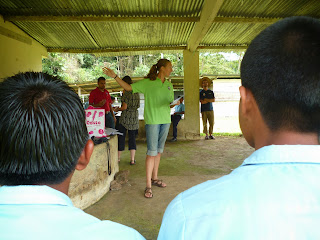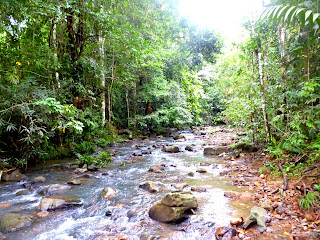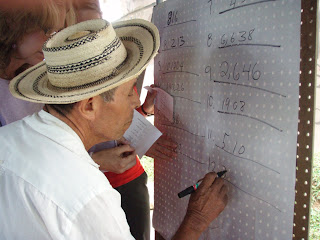Culture Shocking
I experience culture shock every time I come to Panama City
and see Panamanians that look, dress, talk, and act differently from my humble
neighbors in El Harino. As I travel out
in the back of a chiva I watch as the
green jungle scenery gives way to concrete and buildings. Houses change from thatched roofs to zinc to
tile. Electricity lines appear. And suddenly (after about four hours of
travel) I’m dumped into the hustle and bustle of the capital city.
I came home to Los Angeles for two weeks in November. Beyond the generic “I’m in a city” culture
shock described above, here are some observations that amused me during my
trip.
- Whenever I hear a siren, I expect to see a truck driving
through town selling fish, chicken, or vegetables.
- I was surprised every time courteous drivers stopped to
let me, a pedestrian, cross.
- I am better at coping with L.A. traffic than I used to be. Waiting hours for chivas and buses has made me more patient. I think the reverse is also true (L.A.
traffic helps me tolerate inefficient Panamanian transportation).
- Two Panamanian gestures seem to have adopted me. 1) The lip point. When asked where something is, Panamanians
point with their lips instead of their fingers.
It looks silly. I have been
caught doing this several times. 2)
Measuring from the tip of your index finger.
To show size, Americans hold their hands apart the given distance. Panamanians hold out their left arm pointing
their left index finger, and use their right index finger to measure along that
left, extended arm.
- Typing on the iPhone I borrowed from my mom was terribly
difficult. This was my first experience
with a touch screen phone, and boy did I struggle. In general, I am bad at communicating via
text messages and noticed myself accidentally waiting days to respond to people. I’m pretty sure that’s unheard of in the
states.
- It was hard to not smile and say, “Buenas, Como está?” to
everyone I passed and to resist the urge to offer them a limp, Panamanian
handshake.
- The peacocks found all over Palos Verdes are prettier and
less noisy than roosters, but roosters are friendlier and have more personality.
- Radio stations play such a variety of music! Even my
favorite reggaeton station in Panama for some reason only plays the same few
songs over and over again instead of all the new good stuff on the radio in the
U.S.
- It was weird to blend in and not get stared at everywhere
I go. It was weirder to dress up, put on
make-up, and blend in better.
- Materialism bothers me even more than it used to. Our culture just focuses so much on stuff.
I’d rather focus on people and human interactions. I laughed watching my little cousins open numerous
Hanukah presents only to prefer playing with the wrapping paper instead. What a waste of material.
- I am more empathetic than I used to be. People-watching out at a fancy LA bar, I saw
individuals that looked rather superficial to me. But what do I know? Getting to know people in my community has
taught me that everyone has a story beyond what you might guess. You never know what people are dealing
with. I’m sure no one who saw me at that
bar suspected that I live in a hut in the jungle with no electricity.
- The two electric appliances I miss the most are
refrigerators and laundry machines. I
loved eating leftovers while I was home.
In Panama I can’t do that ever. And
I loved how clean my clothes got with such little effort.
- Shaving my legs is much easier when I don’t have to worry
about avoiding the mosquito bites.
- Unpacking my backpack in my parents’ living room, I was
horrified to find I accidentally brought home a few cockroaches. If you hear
about an outbreak of Panamanian cockroaches in Palos Verdes, you know who to
blame…
- I spoke to two Environmental Science AP classes at my high
school about sustainable agriculture and the life of a Peace Corps
volunteer. This was extremely rewarding
and I could tell some of these teenagers were genuinely interested and excited
to listen. This also made me feel very
old. I was “that adult” that comes in to
talk to kids about what they can do when they grow up. Weird!
- I really appreciate my friends and family in the states
and miss you all a lot. It’s amazing how
easy and comfortable it is to slip back into that world and feel at home, even
coming from somewhere so different yet that also makes me happy.
Here are some photos of my time home:
 |
| Celebrating my 27th birthday |
 |
| Friends from high school |
 |
| Out at a fancy LA bar |
 |
| Thanksgivukah with my family |
 |
| Hiking around Palos Verdes |
 |
| Pretty downtown LA sunset view from my house |
I landed in Panama City at 8pm on a Saturday and hopped on a
bus to my hostel. Walking across the
small park between the bus stop and the hostel, I completely ate it in a mud
puddle. I noticed the mud and tried to
walk around it, but my foot slipped out in front of me and I fell backwards on
my butt. Thankfully I didn’t hurt
anything and no one saw me. If they had,
it would’ve been quite a sight to see a tall Gringa struggling to pick herself
up from a mud swamp while trying to keep my backpack and other bags from
getting completely submerged in the muck.
I like to think Panama was just telling me, “You look too clean to be
here … Welcome back!”
Back to the Grind
(sort of)
It is acknowledged that very little work gets done during
November or December in Panama. In
November there are something like four separate holidays relating to Panama’s
independence (from Colombia, from Spain, and I’m not sure why else). In December, in addition to Christmas, Panama
celebrates Mothers’ Day and various graduations around the middle of the month
when schools break for summer (they start up again late February).
So I am back in site, and quickly booked up my calendar with
fun community events and not much real work.
But hey, community integration and cultural exchange is a critical part
of my job too, so I’ll keep at it just the same!
 |
| Mothers Day celebration at the school |
 |
| Taking a pic with this year's "Queen Mom" |
 |
| Xmas school procession |
 |
| School nativity scene equipped with live goats and real baby |
 |
| Pretty sunset view from my hammock on my porch |









































